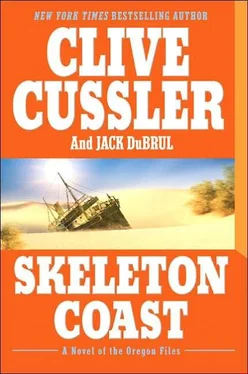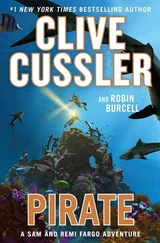“Is Linc ready?”
“Our cue to launch the SEAL boat was five minutes after Mikey took out the generators. He’s leaving now.”
LIKE a jet fighter being catapulted off an aircraft carrier, an actuator punched the semi-rigid black boat down a Teflon ramp from the boat garage and into the ocean. With a deep V hull for stability and an inflatable curtain for additional payload, the boat had been built by Zodiac’s military division in Vancouver, Canada. She could cut across almost any sized wave as nimbly as an otter and hit speeds in excess of forty knots thanks to a pair of 300 hp outboards.
Linc had the wheel while Jerry Pulaski stood at his side. Both men wore two flak jackets over their utility uniforms. Bulletproof shields had been screwed into place so the helm amidships was nearly invulnerable.
At their feet sat two long black cases containing Barrett M107 .50-caliber rifles. They had an effective range of a mile, making the thirty-two-pound guns perhaps the finest sniper rifles ever created.
With so much crude contaminating the waters around the loading terminal neither Juan nor Max were willing to risk theOregon ’s drive tubes becoming clogged with oil. And neither was willing to risk firing at the sensitive loading gantries if they couldn’t guarantee one hundred percent accuracy from her weapons systems. It would be up to Linc and Ski to form the backstop for Mike’s charge down the causeway.
They raced across the waves toward the bow of the supertanker lying at anchor and only slowed when the boat started cutting through the slick. The scum of oil was at least six inches thick and clung to the rubber pontoon ringing the hull. Fortunately, the props were below the toxic sludge; otherwise they’d barely make headway.
Behind them theOregon was in motion again, maneuvering to get an oblique firing angle on this critical part of the facility. Though they wouldn’t aim directly for the causeway or the acres-sized floating pier, Max had no qualms about tearing up the ocean all around them with the Gatlings.
Peering through a large pair of binoculars, Ski scanned the slab-sided tanker for any signs that the terrorists were using her as an observation platform. She looked clear. Just to be safe they would board her at the bow, more than a thousand feet from the superstructure, the most obvious place for a lookout.
They reached a string of buoys marking the hundred-yard off-limits zone surrounding the massive ship and there was still no fire from above.
“Dumb as we thought,” Linc remarked.
From up close the ship’s hull under its coat of red antifouling paint looked more like a steel wall rather than something designed to cruise the oceans, and with her tanks nearly empty, the deck rail loomed sixty feet over their heads.
As Linc worked the wheel and throttle to bring them up to the bow, Ski readied a grappling gun with rubber-coated tines. Just before the assault boat slid under the bow’s curve he fired the hook skyward, two strands of nanofiber line trailing behind it. It sailed over the rail and when he drew back on the line it caught hard. Linc tossed a painter attached to a powerful magnet against the tanker’s hull to secure the assault boat.
Though too thin to climb, the nanofiber was stronger than steel. Ski threaded the line through a winch bolted to the boat’s deck and made sure the foot stirrups were secured. When he was ready he saw that Linc had opened the padded cases that held the two sniper rifles. Each already had a ten-round magazine in the receiver and they carried ten more apiece.
“Your chariot awaits,” Ski said and stepped into the stirrup.
Linc did likewise and hit the button to start the winch. The nanofiber line started to slide through the pulley on the grappling. Ski’s stirrup tightened and he was lifted off the assault boat, holding the rifle in one hand and the line in the other. When he was eight feet off the assault boat, the line took Linc’s weight, and both men were lifted up the side of the tanker.
It took just seconds to reach the top. Ski kicked himself out of the stirrup and leapt over the rail. He landed softly and immediately brought the rifle at his shoulder and his eye to the scope, scanning the deck and superstructure for any movement. His stirrup jammed in the small pulley, arresting the nanofiber wire, and leaving Linc to climb the rail in order to reach the deck.
“Clear,” Ski said without looking at him.
They started for the stern, each man running fifty feet and finding cover while the other kept the superstructure in his sights. Although there was no sign of activity anywhere on the ship, they maintained the leapfrog technique as a precaution. It took three minutes to reach the wheelhouse and, for the first time, they went to the port side of the tanker to look down at the loading pier. The twin gantries were taller than the ship, but their fat hoses dangled negligently, so the oil spewing from them fell only twenty feet before splashing to the dock and eventually oozing into the sea.
A rough count showed at least a hundred insurgents prepared to defend the dock. They’d had time to build barricades and fortify their position. Trono and his men were in for a tough slog if Linc and Ski couldn’t disrupt the defense.
“What do you think?” Ski asked. “Is this good enough or do you want to get higher?”
“The height’s good but we’re too exposed if there is someone skulking around the ship. Let’s get to the roof of the superstructure.”
While they made their way into the ship and up a seemingly endless set of scissor stairs, Linc gave Max a situation report and learned that Mike and his men had fought their way across the terminal and were now in position.
A door opened near the top of the stairs. A man wearing a pair of black trousers and a white shirt with epaulettes emerged. Linc had his pistol out and pressed between the officer’s eyes before the man had realized he wasn’t alone in the staircase.
“No, please,” he cried sharply.
“Quiet,” Linc said and pulled back his automatic. “We’re the good guys.”
“You are American?” The officer was English.
“That’s right, Captain,” Linc said, noting the four gold stripes on his shoulder boards. “We’re about to put an end to this situation. We need to get to the roof.”
“Of course. Follow me.” They started up. “What’s going on? All I know is one minute we’re taking on our normal load of crude and the next some idiot has yanked the hoses, damaging my ship. I called the marine office but no one picked up. Then my lookouts report armed men on the pier. Now it sounds like my days in the Falklands out there.”
“Suffice it to say, your crew is going to be okay. Just don’t let any of them near the deck or any open spaces.”
“That’s been my standing order all morning,” the captain assured him. “Here we are.”
They’d reached the top of the stairwell. There were no doors but there was a hatch in the ceiling accessible by a ladder. Ski started up without a word.
Linc held out his hand, “Thank you, Captain. We’ll take it from here.”
“Oh yes, right. Good luck to you,” he said and shook Linc’s outstretched hand.
Ski got the hatch open, flooding the stairwell with brilliant sunlight. He climbed through, followed by Linc. There was no way to lock the portal from the top, so they would have to keep an eye on it to make sure that no one came up after them.
The roof of the pilothouse was a featureless plane of white-painted steel shadowed by the ship’s funnel and an antennae array. When they neared the edge they dropped to their bellies so as not to show themselves and again looked down over the dock. At the end of the causeway they could see Mike’s small army awaiting their signal. The UAV buzzed nearby.
Читать дальше












